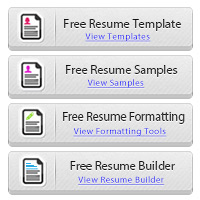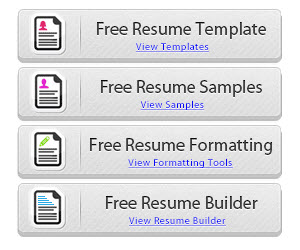College Student Resume Writing Guidelines
College Students who receive interviews constantly format their resume very well, and come across as professional and able candidates.
They know that the average employer will take less than a minute to skim through your resume. You have all of 60 seconds to talk about yourself, so whatever you write down should be marketable and appealing, not just a bunch of statistics and irrelevant references.
Below are the essential ingredients for a resume writing format for fresh graduates and current students.
Resume Style and Format for Recent College Graduates and Students
- It should not go beyond one page, and the font size should be between 10 and 12 units.
- There is a wide array of templates on the internet. Choose the ones that are well organized and avoid colorful or otherwise catchy resume formats.You need to put yourself across as professional and somebody who is able to fill the job openings.
- Ensure that margins fit
- Proofread your resume, and have somebody else proofread it as well.
- When you are done with your resume save it in a word format or chose .doc. Don’t bother converting it to the friendly PDF format, most applicant tracking system will have a hard extracting information from it.
- Name your resume file appropriately, using your first and last names, followed by the name of your college.
Resume Objective or Professional Summary
- Present a powerful picture of yourself.
- Do not exceed four sentences.
- Avoid using the first voice.
- Provide brief information about yourself, and be keen with the contact information.
- Anything you say should be accurate and current.
Your resume objective is very outdated at this point. Most likely you googled your way to something like this “Dedicated Business Administration graduate pursuing a position in an environment where I can utilize my experience and skills in … bla bla bla“
What this tells me is that you have no idea what you want to do, and I don’t blame you. Students who recieve jobs quickly after college make sure to tailor the resume objective towards each position they apply for. I wrote a guide on how to tailor a resume to job descriptions that may help.
replace it with a strong resume introduction.
With an academic background in HR, along with experience working with internal and external clients in a sales and customer service environment, I have the knowledge, experience, and potential to succeed. My knowledge of HR processes, including sourcing, screening, interviewing and evaluating benefits and compensation, along with my attention to detail and interpersonal communication skills, will help me achieve success.
Resume Education Section
Here, you need to talk about your most recent academic activity, including the college you are currently attending, its location, a timeline for when you expect to graduate as well as an outline of your majors.
- Do not talk about high school.
- It would be unwise to include your GPA unless it is above 3.5
Your employer will want to see your degree laid out clearly, for example, Associate of Industrial Sciences, Design and Apparel or Bachelor of Science, Diplomacy and Public Relations. I wrote a guide on how to list education on a resume that may help.
Relevant courses Resume Section
For the fresh students, fill in this space with a little bit of information regarding what you are currently doing. As you diversify, take this section off and fill in the area with courses you have taken outside your area. It helps to list courses that mirror the skills the employer is looking for. For example if you employer wants to see strong excel skills, listing advanced data modeling in excel will put your resume above the rest.
Most students try to impress by listing all random courses, Micro Economics, Macro Economics, this doesn’t impress anybody and can be a big waste of space on your resume. Limit the courses and make sure they are relevant to the role you are applying for. Take a look at the skills or the technical requirements section of a job description and list courses that would closely relate.
Work experience
Start with your most recent area of employment, providing a short description of the employer, their area of specialization and the state they operate out of.
Many students only list the tasks they were involved in, please do not be too basic. Listing tasks only shows that you don’t put much work into your resume, and doesn’t allow you to emphasis how well you did.
Let’s say you had a data entry position while in school, how would you list your experience?
a) Preformed data entry (80% list just this much)
b) Preformed data entry with 100% accuracy score. ( a little bit better, but again you’re not selling yourself well enough, 100% doesn’t mean anything to a me)
c) Create, manipulate and edit 500+ reports and pivot tables in Excel on a daily basis to improve operational efficiency, data accuracy, and reporting consistency.
- If you underwent training while on the job, include it on your resume.
- Cap it off with a short list of the accomplishments you garnered at every place of work.
- Keep it short and use the right tenses. Do not use the present tense id you are not currently employed.
- Use relevant statistics to make a point.
Additional information to List o a Resume
Talk only about what is relevant, e.g., leadership skills or positions.
- Skills – These should be factual and provable. If you say you have expert computer skills, then mean it. When it comes to college, do not say that you are fluent in Spanish when you essentially have a working knowledge of it: state clear and truthful ideas.
- Volunteer activities – Most college students make the mistake of mixing this section with their employment information. Volunteer work is distinct from what you did for pay. Do not duplicate information at this point .For example, your experience with community development initiatives is borne out of the need to sacrifice and help and therefore forms a part of your volunteer activity.
- Affiliations – List a few groups or organizations you were involved in and state your level of connection to them. Before doing so, ensure that they can actually vouch for you.
- Activities – Talk about the organizations you provided active service for.
Listing relevant Interests may help
If you have enough content already, scrap this section off. While most resumes have it, it does very little in a way of getting you before the interview panel. If you on the other hand have little or no experience then this can work in your favor. Let’s say you are applying for a sales position, then listing common terms that most sales people are familiar can help. For example listing “zig ziglas closing the sale“, “buying behavior“, “one minute manager“, could get you in front of hiring managers. Every industry has a few key books or common affiliations and interests.
You will need to understand that you are now in college, so information about your high school achievements will not serve any productive purpose at this point. Focus on what you have already achieved and expound on what you are aiming for at the present moment. However, if you are a freshman, it is okay to use statistics and abstract information from your high school years if you feel the need to bulk out your resume .You will need to get rid of these when you have amassed sufficient experience and academic prowess at your level.




